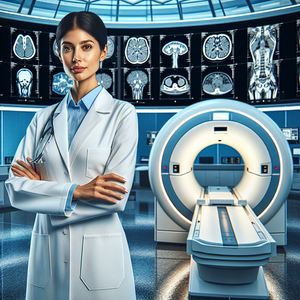The Salary Journey: From MRI Technologist to Advanced Imaging Specialist

Before delving into advancement opportunities, it is crucial to define the primary role of an MRI technologist. These healthcare professionals are responsible for performing magnetic resonance imaging scans, which aid in diagnosing and monitoring a wide range of medical conditions. They work closely with radiologists and patients, necessitating a combination of technical skills and compassionate patient care. With the continuous rise in demand for accurate diagnostic imaging, the need for skilled MRI technologists is at an all-time high.
Advancement Opportunities
One of the most effective strategies for advancement as an MRI technologist is obtaining additional certifications in specialized imaging techniques. Professional organizations like the American Registry of Radiologic Technologists (ARRT) offer certification programs that allow technologists to specialize in areas such as cardiac MRI, pediatric imaging, or musculoskeletal imaging. These certifications not only enhance a technologist's skill set but also make them more appealing to employers, often translating into higher salaries.
Specialization through Certification
An MRI technologist who specializes in cardiac imaging can command a higher salary due to their expertise in this niche area, often earning 10-20% more than their peers who do not have this specialization.
Pursuing Higher Education
Many MRI technologists opt to advance their education by pursuing bachelor's degrees or even master's degrees in related fields, such as radiologic science or healthcare administration. Higher education equips technologists with a broader understanding of the healthcare system and prepares them for roles in management, education, or research.
Transitioning to Advanced Imaging Specialist Roles
As the healthcare landscape evolves, there is an increasing demand for advanced imaging specialists who can operate more complex imaging equipment, such as hybrid systems that combine MRI with other modalities like PET scans. Transitioning into these roles often requires additional training and experience but can lead to lucrative career opportunities.
Continuing Education and Professional Development
Remaining current with technological advancements and best practices is essential for career progression. Many technologists engage in continuing education through workshops, seminars, and online courses. This ongoing learning can lead to new certifications and skill sets that enhance their employability and salary potential.
The Financial Impact of Career Advancement
The financial benefits of advancing from an MRI technologist to a specialized role can be substantial. According to recent salary surveys, MRI technologists can expect an average starting salary of around $60,000. However, those who pursue advanced certifications and education can significantly increase their earnings. Advanced imaging specialists can earn between $80,000 and $100,000 annually, depending on factors such as location, experience, and area of specialization.
The career journey of an MRI technologist does not have to be static or limited. By pursuing specialization through certifications, advancing their education, transitioning to advanced imaging roles, and committing to continuous professional development, MRI technologists can unlock new opportunities and significantly enhance their earning potential. In a field that is continually evolving, those who invest in their skills and knowledge will not only reap financial rewards but also make significant contributions to patient care and the healthcare industry as a whole. The path from MRI technologist to advanced imaging specialist is more than a career move; it is a transformative journey that can lead to a fulfilling and financially rewarding professional life.
Cardiac MRI Technologist
Hospitals, cardiovascular clinics, and specialized imaging centers
Core Responsibilities
Perform MRI scans specifically focused on the heart and surrounding structures, ensuring high-quality imaging for accurate diagnoses.
Collaborate closely with cardiologists to discuss imaging findings and assist in the development of patient care plans.
Required Skills
Specialized knowledge of cardiac anatomy and pathology, along with proficiency in advanced cardiac imaging techniques.
Certification in cardiac MRI through organizations such as the American Registry of Radiologic Technologists (ARRT).
MRI Safety Officer
Hospitals, outpatient imaging centers, and regulatory agencies
Core Responsibilities
Develop and implement safety protocols for MRI facilities, ensuring compliance with regulations and minimizing risks to patients and staff.
Conduct regular safety training sessions for staff and maintain records of incidents and safety audits.
Required Skills
Strong understanding of MRI physics, safety guidelines, and risk management practices.
Certification in MRI safety from recognized institutions, such as the American Board of Magnetic Resonance Safety (ABMRS).
MRI Educator
Community colleges, universities, and vocational training schools
Core Responsibilities
Teach MRI technology and techniques to students in radiologic technology programs, both in classroom settings and through hands-on clinical training.
Develop curriculum and training materials that reflect current industry standards and technological advancements.
Required Skills
Advanced knowledge of MRI principles, along with teaching experience or a background in education.
A master’s degree in a related field or a bachelor’s degree with significant clinical experience.
Advanced Imaging Specialist
Multi-specialty healthcare practices, research institutions, and advanced imaging centers
Core Responsibilities
Operate and maintain complex imaging equipment, including hybrid systems that integrate MRI with PET or CT scans for enhanced diagnostic capabilities.
Analyze and interpret imaging results, providing detailed reports to radiologists and other healthcare professionals.
Required Skills
In-depth technical knowledge of various imaging modalities and advanced imaging protocols.
Additional certifications in advanced imaging techniques and significant clinical experience.
Radiologic Technology Manager
Hospitals, healthcare systems, and outpatient imaging facilities
Core Responsibilities
Oversee daily operations of the radiology department, including staff management, budgeting, and compliance with healthcare regulations.
Ensure the implementation of quality assurance programs and promote ongoing staff education and training.
Required Skills
Strong leadership and organizational skills, along with experience in radiology or imaging services.
A bachelor's degree in radiologic technology or healthcare administration, and management experience in a clinical setting.


